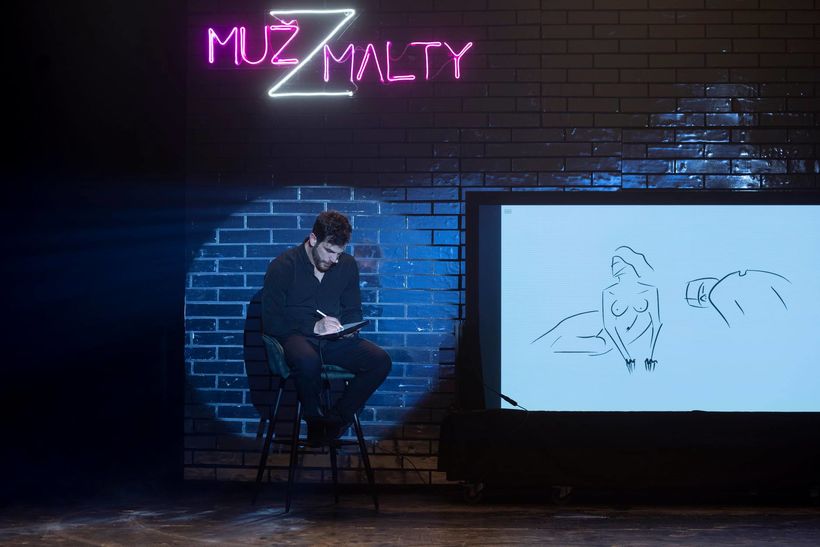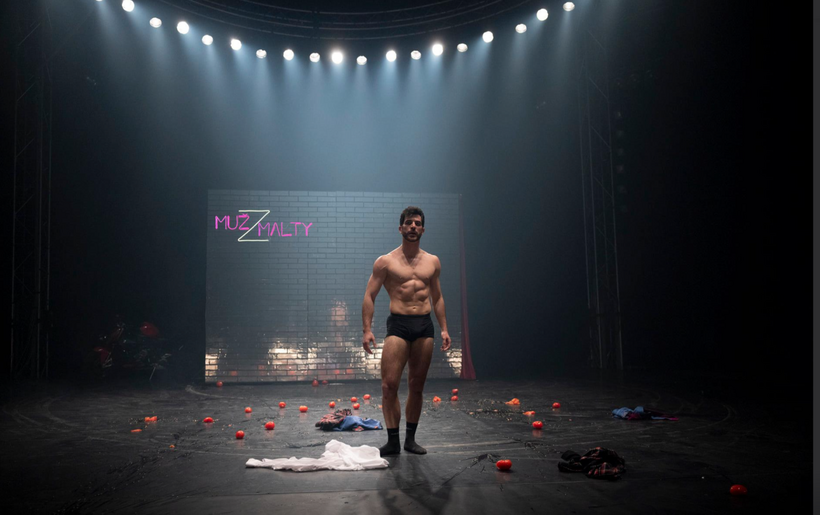Demon from Malta
Those who keep a diary will have most certainly made an entry upon their first post-pandemic visit to a theatre. What an event! The creatively minded of you may well have stuck in their ticket as a souvenir, the even more creatively minded might have taken a selfie with a full auditorium behind you. I’d do the same, I bought a ticket, took a selfie, my diary is around here somewhere...but instead of its pages, I’ll confide in you. Listen up: this is how I was plunged into the chaos of experience.
I’m not one of those people who really suffered from this two year theatre detox, but I was looking forward to seeing The Man From Malta (Muže z Malty) at Azyl78. A nice new tent, a new space, a new performance, an event! And most of all, the new US! Us, transformed by the pandemic madhouse, in which everything turned upside down, times went mad and us too.
Those released from the Covid detention centre may be more naked, fragile, humble or even angry, and definitely curious. What will it be like? How will we react? Will we inhale performances through respirators? And maybe in that sacred new beginning we’ll experience the powerful touch of a cultural ritual! Together again! I certainly didn’t envy Štěpán Pechar in that sense, to stand in front of people after such a period and kick off the season in a prominent performance space, especially with a solo piece. At the start I had no idea that for 90 minutes he wouldn’t leave the stage, performing as for his life, speaking several languages, dancing, drawing, interacting with the public… Stand-up takes courage. It takes balls.
The Man from Malta belongs to the repertoire of the entire Dekkadancers ensemble, who have been operating professionally for more than a decade, although somewhat part time, while its members worked at the National Theatre. If my information is correct, Dekkadancers are now fully standing on their own two feet. And with The Man from Malta they have started this new era full of boldness and bombast.
First of all, I’ll go on record to say that Štěpán Pechar put in an admirable performance. If I wasn’t wearing a mask, it would have been obvious how my mouth gaped open at times and how often I gasped. I couldn’t take my eyes off it the entire time, only now and again I glanced at everyone else to make sure they were seeing and hearing what I was.

Through a personal, run-of-the-mill life story of the son of a Maltese mother and Czech father, Pechar expanded on the origins of contemporary toxic masculinity. And he went about it with style. From endearing stories of a molly-coddled blue-eyed boy to expressions of a perverted chauvinist engulfed by rage. The performance space was structured as a series of individual stand-up routines, they even appeared on the big screen and the audience, thanks to the mobile wall, occasionally got a sneak peak of the other side of the barricade into the backstage area where our protagonist took a breath from the splendour and misery.
It was all introduced by a tabloid overture called, “Foreigners in Prague”. In this it was clear to see that the performance had matured over time, as leading tour groups over the Charles Bridge in Prague had not been a frequent activity for a regular Prague resident for some time. This overture largely helped to lay out and remind us of the usual clichés around national mentalities which, despite the globalised world, we still find interesting. As Werich said, “That is stupid, they’ll like it.” And for Pechar it was a chance to warm up all manner of diction and accents, stylisations and parodies, an opportunity to show off his linguistic gifts and innate entertainer talent. As he recounted an ambiguous explanation of a trip to the Charles Bridge to some charming female foreigners I was slightly worried that he himself had got lost. Really? Are you going to entertain us like this, Mr Werich?
The family story theme, dominated by his mother’s comical Czech and his Dad’s profession as a gastroenterologist were an amusement park of risqué double-entendres and toilet humour. And then it started to heat up, a catholic boy school and the beginnings of the internet. At that moment Pehcar grabbed a tablet (until then it was only physical and verbal expression) and began to project the sketches he was doing live onto the big screen. They were deft, erotic sketches which he perfected when he was 11 years old and now, in front of a packed Azyl78, he was able to conjure necklines and crothes in various positions with a firm hand on the tablet. His artistic talents turned into a rather lucrative childhood business, with teachers and even the headteacher as customers. You just don’t expect this. Especially when Ferigate is circulating in the public domain and you are scared to watch the news in case a naked pervert in a trench coat jumps you. In this sense, live theatre is irreplaceable - it ‘innocently’ communicates its content which was created God-knows-when and for God-knows-what purpose and ‘here and now’, like an elephant, it crushes our porcelain reality, the shards of which we’ve swept under the carpet for years, we’ve ignored injuries and locked away unpleasant experiences in the cellar of our collective unconscious. And then we are confused, startled, surprised when the documentary Caught in the Net (V síti) appears, a perverted rapist is borne of a childhood idol, or when The Man from Malta, instead of nice, humorous dancing, pronounces the names of our demons out loud.
It is hard to say what was more frightening, a childhood erotic business in adolescence, or the later epigenetic classification of people by their appearance, the numerous vulgarities or the apt parody of rich and successful people who take up space simply because they laugh louder than others. By the way, this scene, which is pre-filmed in the style of a chat show, is absolutely brilliant!
The Man from Malta’s strength is definitely the openness and force which with Pechar fought demons such as power, sex, porn, cash and masculine superiority in the auditorium. It’s quite possible that he was fighting himself. He bore his soul with some parts of his story, but he displayed all his talents, including dance. Where else in the world would you see a stand up comic who provides a commentary to his own monologue with perfect dance expression. Štěpán gave artistic versatility a new dimension and also shattered the expectations we had with Dekkadancers. Instead of the usual parodic dance fun they poked a hornet’s nest, and whilst Štěpán fought the hornets off valiantly, in the audience the respirators got up and left in disgust. If we like, we can be reminded of the aforementioned theatre ritual, where the artist, like a shaman, takes us on a journey into the underworld and offers insight which can help and heal us. It’s no wonder then that the next day Štěpán was unable to repeat this trip and the reprise had to be cancelled. But one thing is certain, the shadow of which The Man from Malta spoke is deep and dark. And it’s imperative to shine a light on it.
One further concluding note. Štěpán Pechar’s indisposition once again led me back to the question of how do we look after those who give demanding performances on stage and are expected to repeat them as a matter of course? In sport, a team of coaches, trainers, masseurs, physiotherapists and various analysts work together to consistently improve an athlete’s performance, whilst keeping them fit and healthy. In the arts, performance is also expected, but care is not given. It may well be that one day there is no-one left to take to the stage to take us on a journey of astonishment and amazement, at once purifying and cleansing us.
Written from the premiere, 30th May 2021, Azyl78.
Man from Malta
Choreografy and direction: Štěpán Pechar
Assistant director: Pavel Knolle
Assistant choreographer: Ondřej Vinklát
Perfomer: Štěpán Pechar
Music used: Existing recordings (Darkside, Queen, Rone)
Lighting design: Karel Šimek
Staging: Pavel Knolle
Translation: Aaron Bohlman




